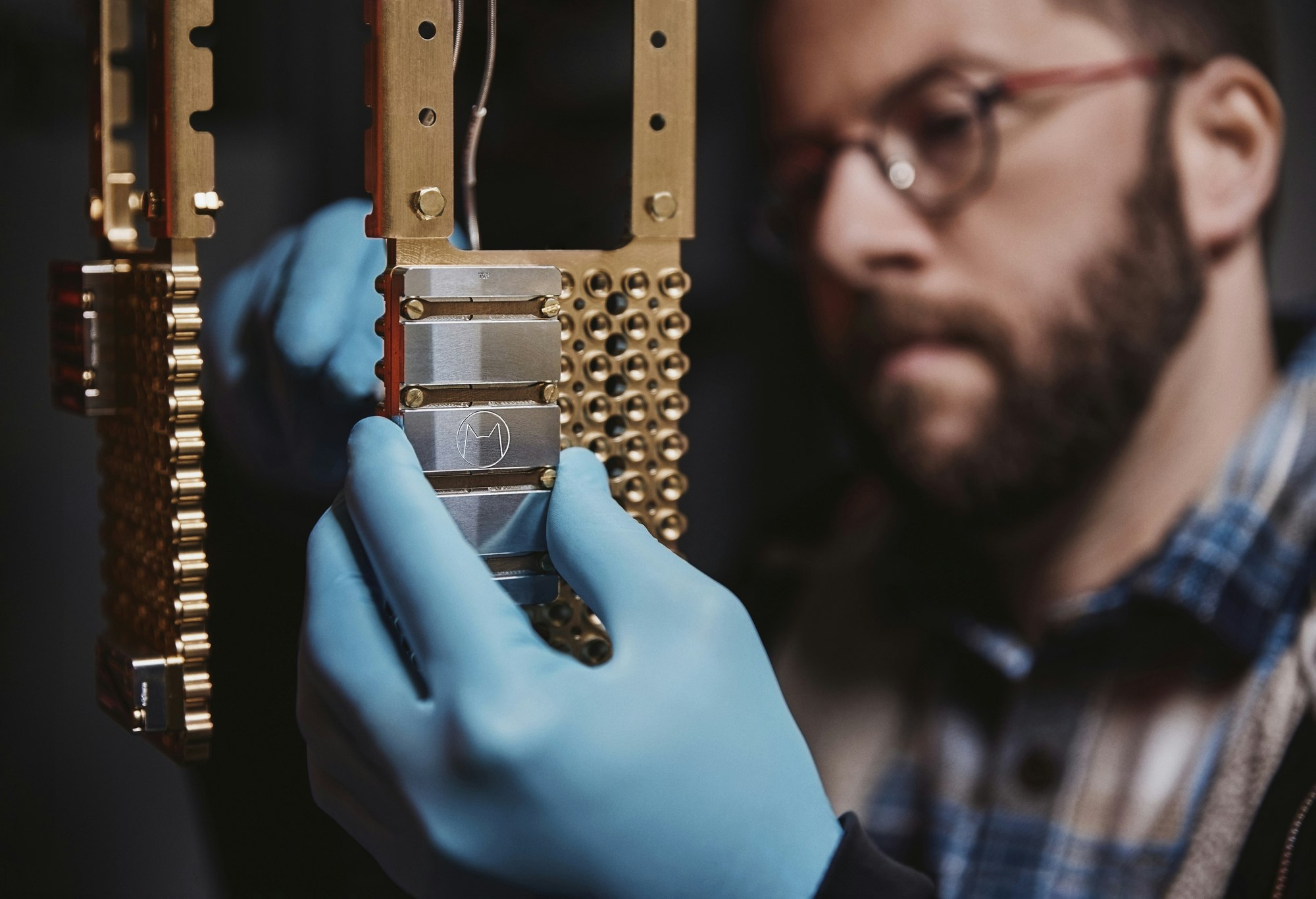You can tell a lot about someone from their choice of restaurant. Entrepreneurs that Sifted has previously invited for brunch have opted for swanky restaurants in Knightsbridge, or even their own stately home.
For Carina Namih, partner at London-based VC firm Plural and cofounder of US biotech company HelixNano, it’s Science Gallery London, a space dedicated to getting young people from the local area interested in science.
“I was involved in the early days when this place was being set up. I was part of a group thinking about the programming we could put on here,” she says, between mouthfuls of avocado on toast.
“With science and technology moving as fast as it is, I think it's really important that it's a conversation we have across all groups in society, and that there are diverse voices engaged in that conversation.”
It’s not the only thing she says that gives the impression she’s conflicted about the world of hypergrowth technology companies she’s a part of, as she balances caution and optimism in an industry where many share the mantra that more innovation is always good, no matter the cost.
And, as I learn over our hour-and-a-half brunch, she’s not shy about sharing her opinions on the interplay between power and responsibility for tech companies and the people who invest in them.
The making of an AI investor
Namih, who arrives at our meeting dressed casually in frayed white jeans, trainers and a rollneck jumper, is refreshingly keen to get “off message” for an investor working in the infamously self-promotional VC industry.
We begin our conversation with her asking in depth questions about my background in audio production, before reflecting on the sound design in Denis Villeneuve’s Dune: Part Two, and it takes a bit of work to get Namih talking about what we’re here to talk about: Namih.
“It’s definitely not my forte talking about myself, but I will give it a shot,” she says.
Namih — who now invests largely in applied AI companies — didn’t get into technical company building via the typical routes of a scientific PhD, coding school or an MBA.
She studied Politics, Philosophy and Economics at Oxford — a course that counts three of the UK’s last five prime ministers among its alums — which had the effect of totally turning her off the idea of pursuing any interest in the political machine.
“I really didn't click with the politics part of it at all,” she says. “I just don't subscribe to the ‘great man of history’ idea that these individuals come along and change everything.”
Instead, while at university Namih became fascinated by what she calls the “deep drivers” of social and economic change and “technology in particular.”
“I got really obsessed with the personal computer revolution that happened in California around the same time as the hippie counter cultural movement,” she says. “There was the Whole Earth Catalogue crowd… there was this idea that the internet was going to be this democratising force, before it kind of got co-opted by these big tech companies.”
The next technological revolution, she was sure, even in the early 2010s, would be linked to AI and computer chips getting more and more powerful.
“It was really clear to me that the trend that was going to impact my lifetime and society in my generation was Moore's law, computation, AI, it was just so inevitable,” she says. “So when I was in my early 20s, and figuring out that, ‘What do you want to do with your life?’ question, I really had that in the back of my mind, that this was the big driving force.”
Building HelixNano
Namih talks with the kind of clear-sighted conviction that I’d imagine would come in handy if, like her, you decided to pack your bags, leave your home in London and fly to San Francisco at the age of 21 to build a company in a space that no one really understood at the time.
She tells me how, after a very brief stint in banking in London (a role that “was really not a fit” for her), a member of her family got sick, and she became obsessed with the idea that you could apply computation to biological processes.
“It just clicked for me that this data driven and computationally driven approach to biology had huge potential. If we could bring that data science orientation to biology, we would be able to discover better treatments and just do better for patients,” she says.
Once she arrived in Silicon Valley, she fell in with a mix of “countercultural groups like artists and creatives” and “some amazing scientists and technologists.”
“Just the energy in San Francisco was amazing. You could definitely find these communities of people who were thinking very differently about things and had this real California mindset of, ‘How do we remake the future?’”
Soon she met her HelixNano cofounder, Hannu Rajaniemi, a sci fi author and physics PhD who shared her level of ambition to reinvent our approach to healthcare.
They began developing a business around the idea that, if you could build a computational platform that could design RNA — the messenger molecule that sends instructions from our DNA to the proteins that make things happen in the body — you’d be able to re-code human immune responses.
“The big vision at HelixNano is this idea of the immune-computer-interface,” Namih explains. “If you can design RNA computationally, and then be able to introduce it to the body, you can educate the immune system to say, ‘You've missed this, this is actually cancer. You need to go and take care of it.’”
Today, after raising more than $45m in VC cash, HelixNano is working on three research programmes — to “solve cancer, COVID and climate” — with one now entering human-stage clinical trials.
Investors shouldn’t meddle
Namih — as she sips her tea — exudes the calm confidence of someone who knows they’ve climbed a mountain, or at least one of its peaks, and lived to tell the tale. But she’s candid about the gruelling, decade-long effort and “sheer force of will” required to get her company to this stage.
“People thought I was really nuts… But you're young, you think you can run through walls, and it just took a lot out of us,” she says. “You really have to have a strong reason to believe that the world is going to catch up with you. I had to start building this 12 years ago to get to meet the world where it is today.”
In 2022, Namih began investing full-time at Plural, a firm launched that year by four fellow operators-turned-investors with a view to do VC differently (she still sits on the HelixNano board). So far she’s led deals investing in AI legal platform Robin AI and precision medicine startup Sano Genetics.
“I realised I had really strong opinions about which founders I thought had what it took and which companies I thought were onto it. I think it's because I spent so many years finding product-market-fit in my company,” she says.
And while she acknowledges that there are different ways to approach being a VC, and that there’s a skill to the more “network-y” art of finding deal flow, she doesn’t hold back on her thoughts about investors who haven’t earnt that scar tissue.
“I think a lot of investors who don't have the operational background are really genuinely trying to be helpful, but they're kind of going through a checklist of the things they should be worried about,” she says.
“They don't necessarily have that really clear instinct that comes from a place of experience around: ‘What is the thing right now that existentially matters to this company, and this is where I should intervene to help the founder?’ There are lots of things that you shouldn't be meddling in.”
Namih sees lots of other issues in early-stage venture investment — something she describes as a “unique and weird asset class” that’s alien to many traditional investors without operational experience — not least how endless conversations with opinionated investors can water down founders’ vision.
“Often when founders are pitching, you can feel that they're kind of telling you what they think you want to hear. And they end up giving you this weighted average of all the other conversations they've had,” she says.
“It means that their message and their mission can get really diluted. My really strong advice to founders out there is you have to be comfortable having a really strong point of view that is truly your own.”
The good, the bad and the Valley
Namih’s punchy opinions are offset by a visibly thoughtful approach. She’s someone who weighs her words carefully, often pausing for longer than I’m used to before answering a question.
So where does she find some sanity in the highly polarised debate about super powerful AI and how it should be developed safely? She takes more than a couple of moments to think.
“I don't think the flat out race dynamic — for pure profit motivation — is a healthy dynamic. I think it's really important that we have to build more capacity to understand these systems before we just press on the accelerator as hard and as fast as possible,” she says.
It’s a view that arguably puts her at odds with the likes of OpenAI’s CEO Sam Altman, who invested in HelixNano in 2017 after it went through the YCombinator accelerator programme, or other AI evangelists in Silicon Valley for whom the technology is almost sacred.
“Silicon Valley has always had these fringes where people will get really excited about things like transhumanism,” she says.
“When I first moved to San Francisco there was this community of people interested in the idea of computers and humans merging and becoming one. I remember a conversation where someone asked, ‘Who in this room wants to live forever?’ I was amazed to see most people put their hands up. I didn't put my hand up.”
But while Namih might be a bit old fashioned in thinking that “mortality is a really important part of the human condition,” she also sees the huge upsides that come out of the California mindset that was so seductive to her as a 21-year-old.
“What I think is really special about the culture there is this sense of agency,” she says. “It’s like, ‘The future is coming. Do you want to try and make it a good one?’ You also see the difference in some of the VC culture. I think I knew that to get my business backed, I needed to go out there and find VCs who could match my ambition.”
A new kind of European investor
It’s that level of ambition and belief that Namih and her team at Plural are trying to bring to European tech, and she talks with urgency about why Europe needs to build big and impactful companies to keep pace with the US.
“These massive tech companies are not happening enough in Europe for us to remain geopolitically as relevant,” she says. “It's really important that we are that productive here, where we're creating these jobs, we're creating these opportunities and we're part of building that future.”
Namih’s also seen plenty of elements of investor behaviour that she won’t be replicating, and she reflects on how investors often forget themselves.
“You have this power dynamic that I think can go to a lot of VCs’ heads. They kind of forget that there is this very unequal power where you're the gatekeeper to this capital that can unlock a person’s mission and dream,” she says. “It's really important not to abuse that or become complacent about it.”
She’s also seen how that complacency — which might come from a harmless or absent-minded place — can really affect founders as they strive to build something.
“I've really been on the receiving end. I've seen what it's like when an investor will keep asking my male cofounder commercial questions and I, as the CEO, am answering them and they keep asking him the question,” she says. “So I really know what that feels like and just try to be very present and very conscious of those dynamics.”
We end our interview, pay the bill and walk together to the tube station, chatting about the kind of investor groupthink that led to VC speedy grocery bubble bursting.
“I could never be a consumer investor, I just don’t buy enough stuff,” she laughs.
I leave the conversation refreshed and, dare I say it, hopeful, that Namih and her team at Plural really do represent a new kind of European investor. Ones with all of that Silicon Valley ambition to build a bold and better future, and less of that creepy desire to achieve immortality by uploading our brains into the metaverse.
In summary, I’m here for it.


